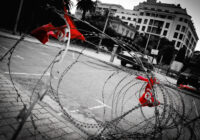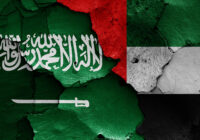Will Saudi Arabia’s Muslim coalition to fight terrorism succeed in its aim?
The Saudi-led coalition to combat terrorism in the Muslim world — notwithstanding its diplomatic and economic bolstering by the Trump administration — will continue to persist as an extravagant delusion for several reasons.
It was in December 2015 that Prince Mohammad bin Salman — who is now the Saudi crown prince — announced with fanfare the formation of the Islamic Military Alliance to Fight Terrorism (IMAFT). This coalition would be Saudi-led and carry the aim of collective security deterrence amid the rising insurgency of Daesh (Islamic State) and its purported financiers in the Gulf.
But only lately has this coalition gained rapid momentum, and it is now commonly dubbed as the “Muslim NATO.” From initially 34 members, seven more countries joined the group by the end of 2016. In January 2017, Pakistan’s former chief of army staff, General Raheel Shareef, was named as the coalition’s first commander-in-chief. At the same time, there was a recruitment drive in Pakistani media for retired army personnel and advisers amid plans for joint military exercises with IMAFT member states.
More importantly, in March and April, US President Donald Trump hosted Saudi Crown Prince Mohammad, Egyptian President Abdel Fattah al-Sisi and Jordan’s King Abdullah, with the express desire to foster this armed front against “radical Islam.” Not coincidentally, these developments took place just months before the ongoing economic and diplomatic embargo against Qatar for its relations with Shia-majority Iran and — tacitly acquiescing to — its growing influence in the Middle East.
Despite solid affirmations that IMAFT would operate in keeping with the United Nations and the Organisation of the Islamic Conference (OIC) provisions on fighting terrorism, all members of IMAFT are countries with Sunni-dominated governments. The official pronouncements are explicit that the alliance is part of Saudi Arabia and the Gulf Cooperation Council’s (GCC) efforts to take a leading role in the Middle East and Muslim world, stemming from a geopolitical rivalry with Iran.
More contentiously, the Saudi-led coalition is engaged in militarily and economically smothering any opposition and/or uprising that could be considered “unfriendly” to Riyadh and the GCC — the most recent manifestation being in Yemen, where battles continue between Saudi-led forces and Iran-backed Houthi rebels. Another instance involves the GCC itself. At the onset of the Qatar crisis in June, Pakistan was presented with a Hobson’s choice as Saudi Arabia asked its Muslim ally: “Are you with us or with Qatar?”
Contradictions
There is a misdiagnosed understanding of IMAFT’s sectarian foundations — in other words, the false dichotomy of Sunni versus Shia. While most non-Arab Muslim countries are unanimously in favor of preserving the sanctity of the holy sites of Mecca and Medina, they are not necessarily in favor of “re-Sunnifying” the geopolitical landscape and flipping the existing power structures. Essentially, due to the number of Sunni-majority countries, the underlying factor is the emphasis on the special brand of Wahhabism adopted by Saudi Arabia, whereby many Islamic principles of other Sunni and Shia sects are considered as apostasy.
Equally significant is the economics of the situation. Saudi Arabia’s unsustainable financial commitment to its military mission — namely in Yemen — comes at a time when its oil-dependent economy is on a rollercoaster. Accordingly, public sector expenditures have been cut and government employment opportunities for the country’s most recent university graduates look less promising than in past years.
There is even talk of some of public sector bills being paid with IOUs There has even been discussion of introducing income tax for expatriates and forced repatriation of migrant labor from South Asia.
Prospects
Saudi Arabia’s desire of becoming a regional hegemon is likely to be overtaken by geopolitical events. These include the scaling back of the US military presence in Syria, the lack of Russian support, and Chinese restraint to alter the status quo — combined with the Trump administration’s reticence for the overt entangling of alliances abroad, beyond the recently-announced continuation of a military presence in Afghanistan.
The ambitions of IMAFT are unrealistic and far more grandiose than its capabilities. Non-Arab countries are quite mindful of their own pressures, internal tensions that exist within their ethno-centric communities, and the permanent interests of their non-homogenous populations with widely differing heritage and cultures.
Not surprising in this context, Turkey and Pakistan, two of the strongest and largest members of the coalition, are striving to widen their portfolio of economic opportunities — the former in Central Asian republics and the latter with Beijing by establishing the China-Pakistan Economic Corridor.
While Saudi Arabia and Iran remain at loggerheads over what Riyadh sees as Tehran’s efforts to tighten its grip on the Middle East, there is growing frustration among the public in non-Arab countries for taking sides in any internecine conflicts of the region.
The views expressed in this article are the author’s own and do not necessarily reflect Fair Observer’s editorial policy.
Photo Credit: Kremlin
Support Fair Observer
We rely on your support for our independence, diversity and quality.
For more than 10 years, Fair Observer has been free, fair and independent. No billionaire owns us, no advertisers control us. We are a reader-supported nonprofit. Unlike many other publications, we keep our content free for readers regardless of where they live or whether they can afford to pay. We have no paywalls and no ads.
In the post-truth era of fake news, echo chambers and filter bubbles, we publish a plurality of perspectives from around the world. Anyone can publish with us, but everyone goes through a rigorous editorial process. So, you get fact-checked, well-reasoned content instead of noise.
We publish 2,500+ voices from 90+ countries. We also conduct education and training programs
on subjects ranging from digital media and journalism to writing and critical thinking. This
doesn’t come cheap. Servers, editors, trainers and web developers cost
money.
Please consider supporting us on a regular basis as a recurring donor or a
sustaining member.
Will you support FO’s journalism?
We rely on your support for our independence, diversity and quality.






